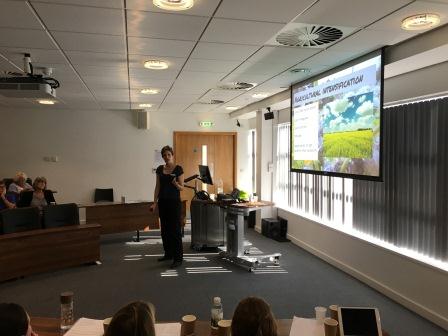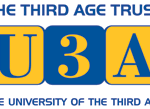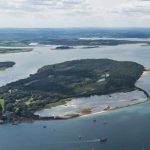Last week we welcomed 35 members of the public into the EBC for an afternoon of conversation around conservation! We welcomed 5 different speakers including 3 academics and 2 post docs from the Faculty of Science and Technology to share their research through a series of presentations and Q&As.
Amanda Korstjen’s opened the event with a talk about her work in tropical forests supporting conservation of primates before Demetra Andreou took over to share how we can use DNA to inform conservation, for example through identifying species of fish present in a river through water samples. We then took a short break for some cake (a key part of any RKEO organised event) before Liz Franklin took over to share her work on pollinators and giving advise on how to make your gardens more bee friendly and speaking on how consideration of pollinators should be a key part of urban planting spaces. We finished off the day with two talks about local conservation in Poole Harbour including Ann Thornton talking on how thickening algal mats are impacting wading birds and Leo Clark sharing his research into the impact of shellfish harvesting on the area.
The day was a great success with highly positive feedback from the audience on the topic. Thank you to all involved for giving such excellent talks.
If you’d like to take part in a future lecture day email nkay@bournemouth.ac.uk 
 Public Lecture Afternoon
Public Lecture Afternoon U3A Afternoon of Lectures – public engagement opportunity!
U3A Afternoon of Lectures – public engagement opportunity! Online public lecture – The Secret Life of Poole Harbour
Online public lecture – The Secret Life of Poole Harbour First BU online public lecture explores living better for longer
First BU online public lecture explores living better for longer










 Seeing the fruits of your labour in Bangladesh
Seeing the fruits of your labour in Bangladesh Exploring Embodied Research: Body Map Storytelling Workshop & Research Seminar
Exploring Embodied Research: Body Map Storytelling Workshop & Research Seminar Marking a Milestone: The Swash Channel Wreck Book Launch
Marking a Milestone: The Swash Channel Wreck Book Launch No access to BRIAN 5-6th February
No access to BRIAN 5-6th February ECR Funding Open Call: Research Culture & Community Grant – Application Deadline Friday 12 December
ECR Funding Open Call: Research Culture & Community Grant – Application Deadline Friday 12 December MSCA Postdoctoral Fellowships 2025 Call
MSCA Postdoctoral Fellowships 2025 Call ERC Advanced Grant 2025 Webinar
ERC Advanced Grant 2025 Webinar Update on UKRO services
Update on UKRO services European research project exploring use of ‘virtual twins’ to better manage metabolic associated fatty liver disease
European research project exploring use of ‘virtual twins’ to better manage metabolic associated fatty liver disease